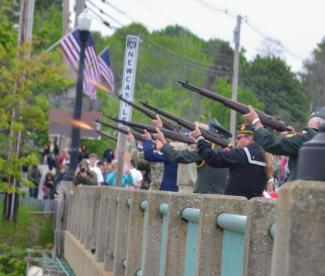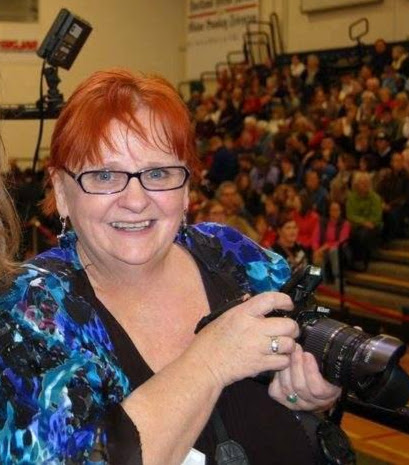What’s the Buzz? How Memorial Day Helped a Nation Heal
May, 2020, the Year of Pandemic. Memorial Day won’t be the same this year. The parades won’t fill our streets, but the flags will still fly. There is a lesson in the origins that we can all use today and that should not be forgotten. This day and remembering our lost soldiers, can also remind us that we know how to heal. We know that , under all the anger and confusion, we are one nation and we can get through anything.Let’s take a lesson from history.We need to remember that we can be on opposite sides of an issue.We honor our soldiers, living and lost, by remembering that we are one nation and that we will get ourselves back to where we belong—– but only if we only pull together
How the Blue and the Gray Turned Sorrow to Reconciliation:
The True Story of Memorial Day.
Our Memorial Day holiday was a manifestation of Lincoln’s hope for reconciliation between North and South. In the years following the bitter Civil War, a former Union general took a holiday originated by former Confederates and helped spread it across the entire country. The annual commemoration was born in the former Confederate States in 1866 and adopted by the United States in 1868.
General John Logan is usually credited as being the originator of the holiday. When General Logan established the holiday, he acknowledged it began among the Union’s former enemies, saying, “It was not too late for the Union men of the nation to follow the example of the people of the South.”
During the inaugural Memorial Day many Southern participants – especially women – decorated graves of Confederate soldiers as well as, unexpectedly, those of their former enemies who fought for the Union. Newspaper coverage in the North was highly favorable to the ex-Confederates.
“The action of the ladies on this occasion, in burying whatever animosities or ill-feeling may have been engendered in the late war towards those who fought against them, is worthy of all praise and commendation,” wrote one paper.
A 10-year-old girl who made a wreath of flowers and sent it to the overseer of the holiday, Colonel Leaming, in Lafayette, Indiana, with the following note attached, published in The New Hampshire Patriot on July 15, 1868:
“Will you please put this wreath upon some rebel soldier’s grave? My dear papa is buried at Andersonville, (Georgia) and perhaps some little girl will be kind enough to put a few flowers upon his grave.”
President Abraham Lincoln’s wish that there be “malice toward none” and “charity for all” was visible in the magnanimous actions of participants on both sides, who extended an olive branch during the Memorial Day observances in those first three years.
When we stand and cheer on the sidelines as our Veterans pass by in our parades, we are cheering not only in support of their service but in support of reconciling our own differences. With the temperature and tempers of many of our citizens rising in this political climate, it cannot hurt any of us to remember where we were 150 years ago.
We need to stand together in support of the ideals upon which our nation was built. We need to remember that we can be on opposite sides of an issue.We honor our soldiers, living and lost, by remembering that we are one nation and that we will get ourselves back to where we belong—– but only if we only pull together.
The Blue And The Gray
Francis Miles Finch (1827-1907)
By the flow of the inland river,
Whence the fleets of iron have fled,
Where the blades of the grave-grass quiver,
Asleep are the ranks of the dead:
Under the sod and the dew,
Waiting the judgment-day;
Under the one, the Blue,
Under the other, the Gray
These in the robings of glory,
Those in the gloom of defeat,
All with the battle-blood gory,
In the dusk of eternity meet:
Under the sod and the dew,
Waiting the judgement-day
Under the laurel, the Blue,
Under the willow, the Gray.
From the silence of sorrowful hours
The desolate mourners go,
Lovingly laden with flowers
Alike for the friend and the foe;
Under the sod and the dew,
Waiting the judgement-day;
Under the roses, the Blue,
Under the lilies, the Gray.
So with an equal splendor,
The morning sun-rays fall,
With a touch impartially tender,
On the blossoms blooming for all:
Under the sod and the dew,
Waiting the judgment-day;
Broidered with gold, the Blue,
Mellowed with gold, the Gray.
So, when the summer calleth,
On forest and field of grain,
With an equal murmur falleth
The cooling drip of the rain:
Under the sod and the dew,
Waiting the judgment -day,
Wet with the rain, the Blue
Wet with the rain, the Gray.
Sadly, but not with upbraiding,
The generous deed was done,
In the storm of the years that are fading
No braver battle was won:
Under the sod and the dew,
Waiting the judgment-day;
Under the blossoms, the Blue,
Under the garlands, the Gray
No more shall the war cry sever,
Or the winding rivers be red;
They banish our anger forever
When they laurel the graves of our dead!
Under the sod and the dew,
Waiting the judgment-day,
Love and tears for the Blue,
Tears and love for the Gray.
Resource material for this article came from Richard Gardiner, Associate Professor of History at Columbus State University
 21 Gun Salute over the Damariscotta River 2018 Memorial Day
Eleanor Cade Busby Photo
21 Gun Salute over the Damariscotta River 2018 Memorial Day
Eleanor Cade Busby Photo

United States
About this blog:

What's the Buzz" covers what's happening, what might be happening, and what should be happening in the opinion of the author.
Eleanor Cade Busby is an unpublished award-winning writer, photographer and blogger & simply loves writing about herself in third person.She published this absolutely all true bio.
Busby grew up all over New England,a preacher's kid who set out to destroy every single stereotype about a "Minister's Daughter."
She attended Goddard College, The Rhode Island Conservatory of Music and The School of Life, majoring in everything she could stuff into her head. She once had her own office and a red stapler. Her employees learned quickly never to touch it.
Much of her very long life has been spent on or back-stage at theaters. She penned a couple of plays, directed many more and acted in scores of productions. She's done it all except hanging lighting. You can't make her climb a ladder.
She won awards locally & nationally for social services and customer care. Most recently she was awarded the PEN/Toni and James C. Goodale Freedom of Expression Courage Award along with 3 million of her closest personal friends for "galvanizing a potent global movement to resist infringements on the rights and dignity of women and many other groups."
Busby has been a theater, art and dance reviewer and commentator for several publications, including CRACKED magazine.
Opinionated, obstinate, much-abused, and under-appreciated, she believes that if it isn't funny or relevant, it isn't worth it.
Eleanor Cade Busby lives in Midcoast Maine with two cats who like to stand on her head at 3 AM demanding a sacrifice, often her sanity.
Suggestions for topics and comments are always welcome at eleanorcadebusby@hotmail.com





































